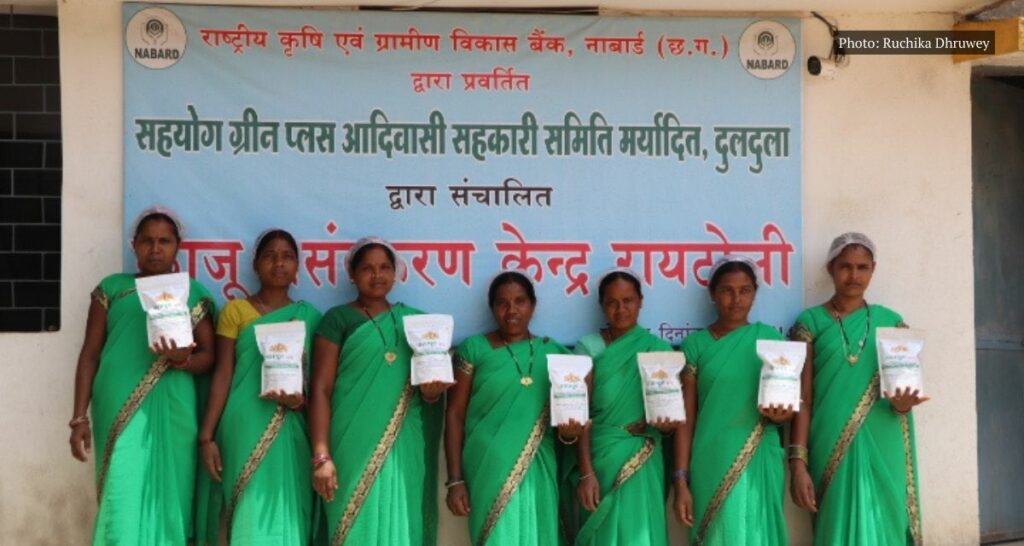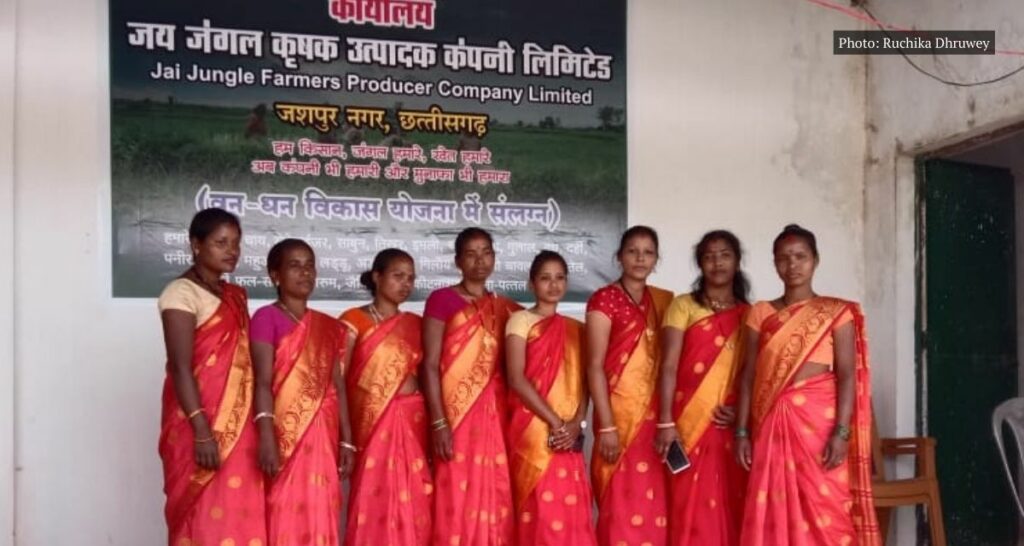By Ruchika Dhruwey
Jashpur district in northern Chhattisgarh, a region known for its dense forests and varieties of rice and tribal communities, is venturing into vastly different fields — thanks to its thriving businesses of forest-based products and spearheading this movement are the women of the tribal communities.
A conducive climate allows residents of this region to grow various crops that aren’t endemic to Central India. In the villages of Sanna and Manora, the relatively low temperature helps farmers grow pears, tomatoes, several types of chillies as well as cashews in abundance. While these crops were earlier all locally consumed, which kept production minimal, farmers gradually grew aware of the demand beyond state borders and through better connectivity, were able to make profits from their production.
In Jashpur, tribal women and male agriculturists work in tandem, growing crops best suited to the environment that bring in the most profits. After the rabi harvest, these tribal women take over the fields to sow cashew nuts. Some tend to the fields while others are involved in the processes that follow their ripening. Once the nuts are processed, they distribute according to the orders received. They supply cashew to local markets, to standalone clients and other markets, including government marts that are tied up with e-commerce companies like Amazon.
Assistance from govt and self-help groups
The state government and local administration play a crucial role in linking the local tribal women with these markets through self-help groups. For instance, the Surajmukhi self-help group in Pakritoli block, Duldula, is active in the production of cashew nuts.
“This small initiative has helped all members flourish,” says Jhimni Bai, president of Surajmukhi. “This bit of extra income plays a crucial role in our livelihood. We can now manage the household on our own and save the money we get through farming. It’s made us independent. Initially, everyone thought we wouldn’t be able to do it. But we now run our group successfully.”
Rajesh Kumar Gupta, head of distribution in Jashpur, guides and inspects these groups from time to time.
“Tribal women and other farmers have united and discovered ways to reduce their production cost and earn more profit,” he says. “Native women and male farmers order compost and other raw materials together, which lowers the transportation rate. They also sell consolidated products to skip different costs from merchants and markets. Such measures ensure that they get the best price for their produce. These markets sell their products across the state and distribute them to other regions as well as online.”

District Collector Mahadev Kawre says their aim was to make tribal women independent, for which they provided assistance in several ways.
“We help them obtain and set up machines and also provide grants,” Kawre highlights. “Next, we link these women with gothans and also help turn animal husbandry into a proper business. People here are now aware of these programmes. Many self-groups have cropped up, and they seek help when required to make progress. The situation is changing for the better, gradually.”
From cashews to sanitisers
Samartha Jain, a young scientist, invented the machine that can be used to turn mahua—a local plant used to make alcohol—into sanitiser. His goal: to provide women with an opportunity to earn an income for themselves and encourage self-dependence.
“They are capable of much more; I merely gave them a tool,” Jain says. “With the help of the forest department, we trained them to handle the machine and produce sanitiser, step by step. We also showed them the different ways to profit from mahua.”
Also read: In Jharkhand’s Dhanbad, Women SHGs Become Mushroom Entrepreneurs & Fish Farmers
Singi is another self-help group based in Jashpur that set the paradigm for many like them, encouraging tribal women to utilise their resources to their entirety. Explaining how they operate this sanitiser-making machine, Shakuntala Uraon, president of Singi, points out that they first gather raw materials (mahua, neem, tulsi, coriander, eucalyptus, jeera and lemongrass), process them and then turn into an organic sanitiser. It has no side effects, is zero waste and uses only locally procured raw material.

“We just buy the bottles from outside for packaging,” she adds. “I come from a nearby village after completing my chores. We take turns to work all seven days of the week to complete our orders on time. Our earnings have increased, as well.”
Karuna Bhagar, secretary of Singi, echoes Uraon’s views, explaining that they earned more currently than they did before the lockdown because people were more aware of them now.
“We manage everything on our own,” she says with pride. “We made mistakes, but we also learned how to correct them. This is how we grow. For technical difficulties, we contact Samartha sir to help us out. We pay our co-workers monthly and divide the profit among us. Our financial condition is better than before with this work.”
Also read: UP Women Entrepreneurs Kickstart Rural Economy Post-pandemic
Ruchika works with the print media ‘The Pioneer’ as Trainee sub-editor. She has completed her Post Graduation Diploma in English journalism from IIMC, Delhi. She is keen to bring light on the grass root level issues that stay unnoticed.
Featured Image Source: Ruchika Dhruwey
This story was published by 101 Reporters and has been re-published here with consent.
About the author(s)
101Reporters is a pan-India network of grassroots reporters that brings out unheard stories from the hinterland.





